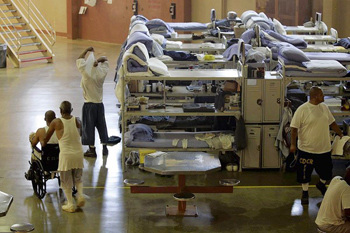Agreeing to hear an appeal from Gov. Arnold Schwarzenegger, the U.S. Supreme Court said Monday it will decide whether the state can be forced to release 46,000 inmates - more than one-fourth of its prison population - to relieve overcrowding.

Bunks are set up in a common area at Mule Creek State Prison to accommodate excess inmates. The facility opened in 1987 with a capacity of 1,700 inmates. It now houses 3,900. (Gary Friedman, Los Angeles Times / June 3, 2010)
The justices said they would hear the case in the fall and rule early next year.
The court's intervention was a victory for the governor and state prison officials.
"We continue to believe federal judges do not have the authority to order the early release of prisoners in our state," said Rachel Arrezola, a spokeswoman for the governor. "California should be able to take action on its own to keep its citizens safe without interference from the federal courts."
At issue in the case is whether federal judges can cure a constitutional violation in a state prison system by ordering the release of some inmates.
A special three-judge panel decided last year that the state's prisoners were being given inadequate medical and mental health care. Denying needed care to prisoners has been held to violate the 8th Amendment's ban on cruel and unusual punishment.
The judges concluded the overcrowding was the "primary cause" of this violation, and they ordered the state to cap the population of its prisons at 137% of capacity. State officials say they would have to release 46,000 inmates over two years to comply with that order.
California's state prison system is the nation's largest, with 165,000 inmates.
The governor and a group of Republican state lawmakers appealed the prisoner-release order, arguing that the judges had overstepped their authority under a federal law intended to restrict lawsuits involving prisons. In his appeal, Schwarzenegger called the order "unprecedented" and said it "intrudes on the state's authority over its prison system."
The case was years in the making, however. U.S. District Judges Thelton Henderson in San Francisco and Lawrence Karlton in Sacramento had ruled in separate cases that prisoners were being denied needed medical care. Court officials stepped in and decided to have a three-judge panel consider the state's prison system as a whole. Judge Stephen Reinhardt from Los Angeles, who serves on the 9th Circuit Court of Appeals, was added to panel.
The judges said last year that they concluded they saw no other remedy than to reduce the prison population. However, they agreed to put their order on hold until the state appealed.
The Supreme Court said it would hear the case, known as Schwarzenegger vs. Plata, in its new term beginning in October and decide whether the judges went too far.
Donald Specter, director of the Prison Law Office that brought the class-action suit alleging inadequate healthcare, said he was not surprised by the high court's action. "There was always a danger," he said, that the liberal-leaning panel in California would be reversed by a conservative majority of justices in Washington.
"But the three-judge panel did exactly what Congress told them to do in these situations," Specter said. "And the three judges are also doing what the governor has tried to in each of the past three years" by reducing the prison population and the state's spending on corrections.











